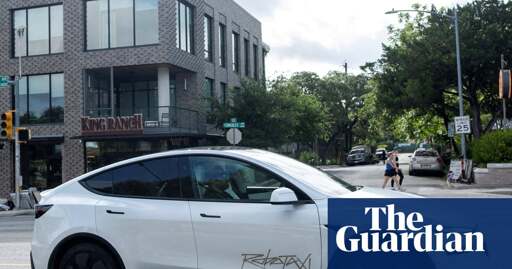- cross-posted to:
- [email protected]
- cross-posted to:
- [email protected]
After years of promising investors that millions of Tesla robotaxis would soon fill the streets, Elon Musk debuted his driverless car service in a limited public rollout in Austin, Texas. It did not go smoothly.
The 22 June launch initially appeared successful enough, with a flood of videos from pro-Tesla social media influencers praising the service and sharing footage of their rides. Musk celebrated it as a triumph, and the following day, Tesla’s stock rose nearly 10%.
What quickly became apparent, however, was that the same influencer videos Musk promoted also depicted the self-driving cars appearing to break traffic laws or struggle to properly function. By Tuesday, the National Highway Traffic Safety Administration (NHTSA) had opened an investigation into the service and requested information from Tesla on the incidents.
Let me tell you how thrilled we all are to have a new hazard added to Austin streets.



With good integrated design, the LIDAR could be practically invisible. So weird to think the average person actually would care about the details of how something works, or maybe Elon Musk just literally cannot imagine a car that uses LIDAR without it having a big assembly on the roof.
This has nothing to do with aesthetics and everything to do with reducing production costs. The sensors themselves add to costs, but then the data processing for all of this data adds to the computational needs of the system, sensor installs requiring calibration and flexibility for changes in sensors add costs. The list goes on.
Musk and Tesla are standing firm on their position that LiDAR is needless and that others will follow their lead here, but so far in practice the lack of LiDAR in Tesla vehicles has shown to be a serious disadvantage compared to other systems.
Compared to the Cybertruck’s design, I don’t think having a LIDAR antenna on top of the car is so bad.
Yep, I used to work for a robotics company that makes self-navigating floor cleaning robots. The LIDAR is completely integrated into the housing of the robot in both the old designs and the new one; it’s barely noticeable.
I also much prefer my robot to not send a live camera feed to some Chinese server. So even if Lidar were to be less good I’d opt for that.
Looking at their recent facelifts, I don’t think they have many good designers left
I have a theory on this. They use a lot of ML for FSD and Ap. That a radical redesign would change the model enough that they would have to retrain from scratch. So they keep the facelifts extremely minor .
Just a theory.
Tesla’s used to have LiDAR - they turned them off in software and stopped adding them to newer models.
A long time ago Elon promised that full self-driving would be coming to existing cars that had their self-driving package installed which was cameras only. Elon is probably sticking with cameras only to avoid a lawsuit.
They stuck the model Y’s new added front camera right under the “grille” shape (where the black trim ends and body colored panels begin), so the rest of it being so bland doesn’t have an excuse. The rest of it’s front cameras are under the front glass, they could at least make an interesting fascia, even if they had to keep the dimensions roughly the same